AWM41 1028 - [Nurses Narratives] Sister Richmond - Part 1
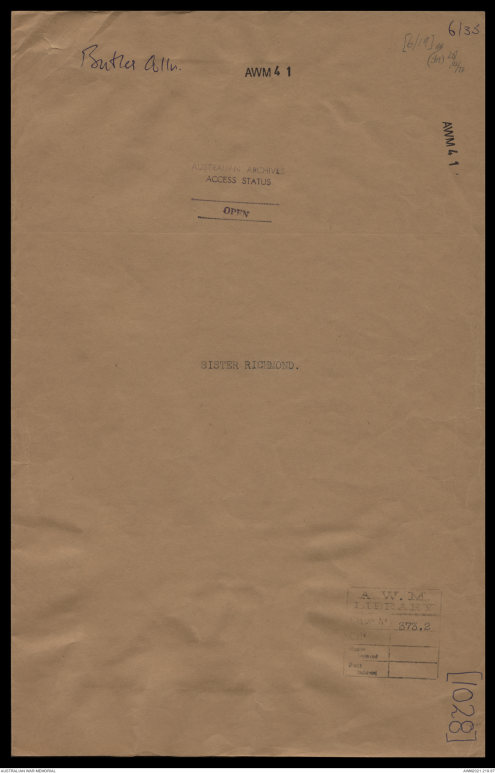
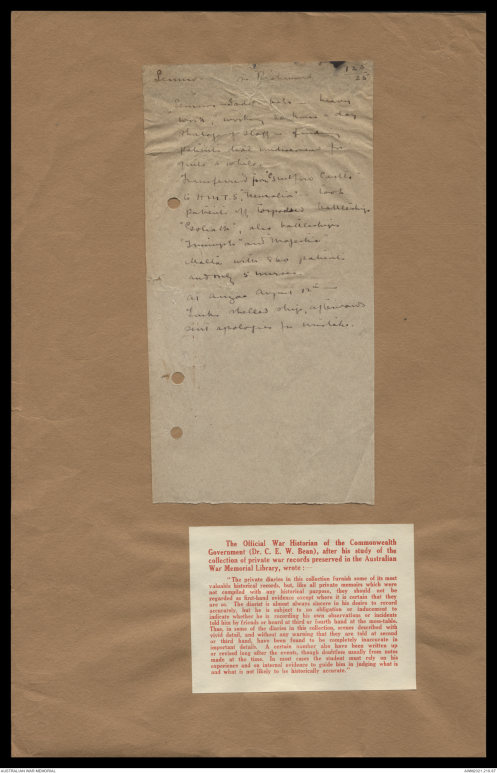
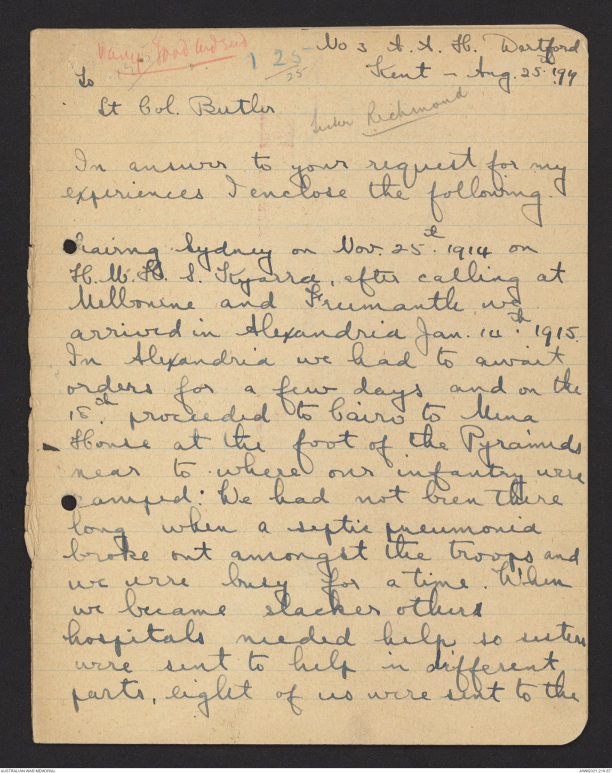
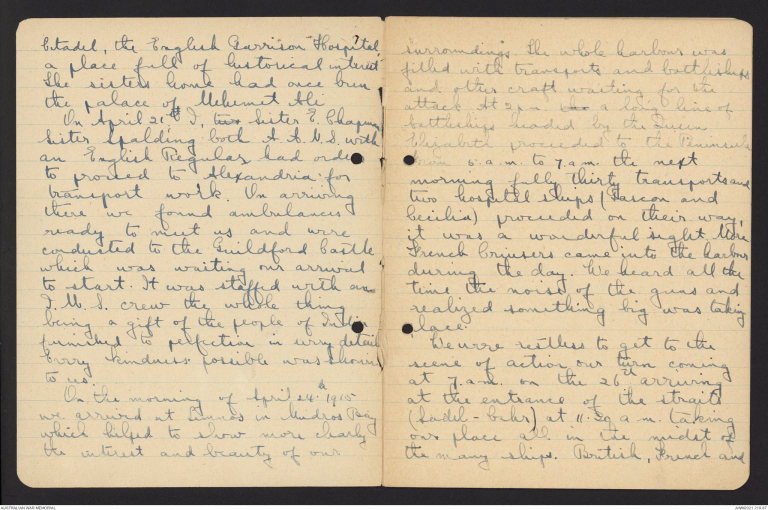
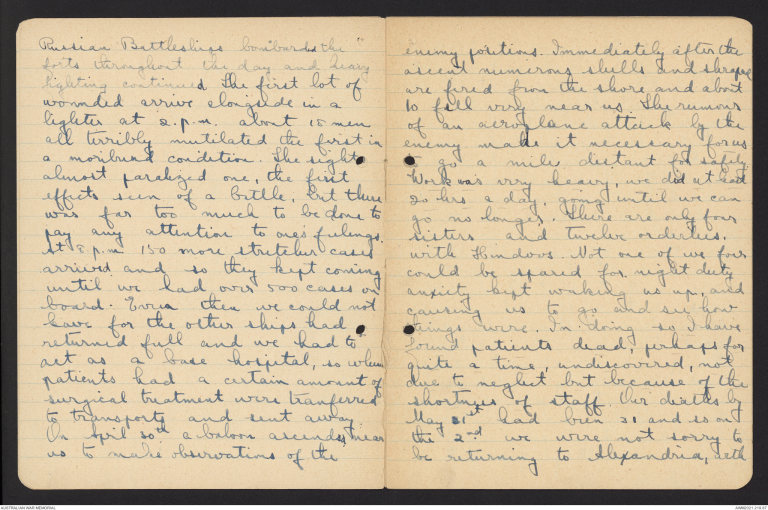
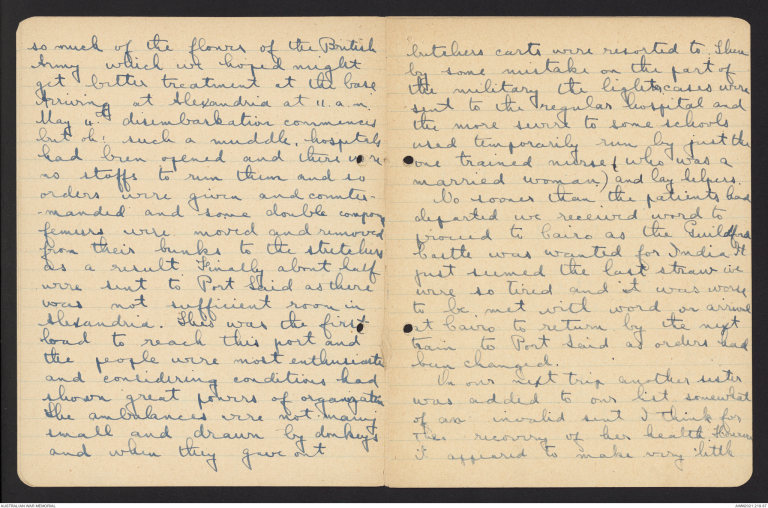
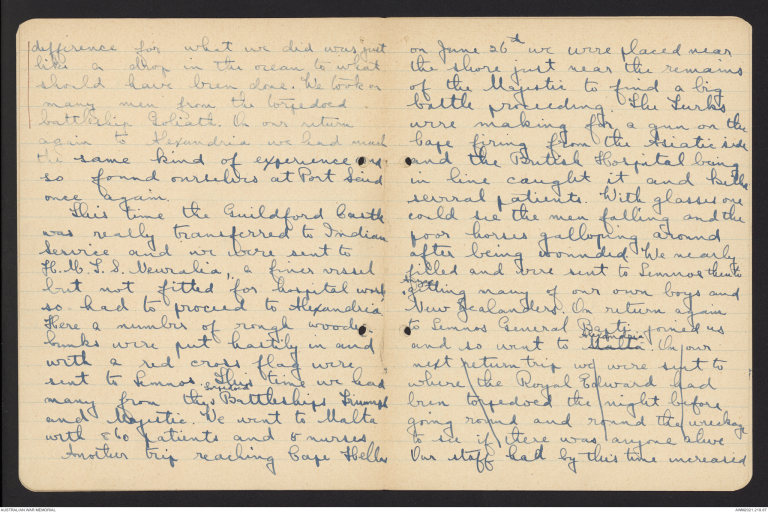
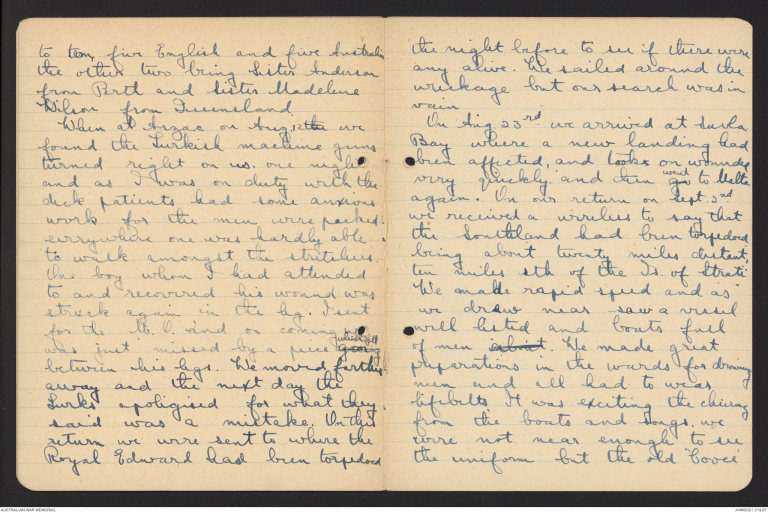
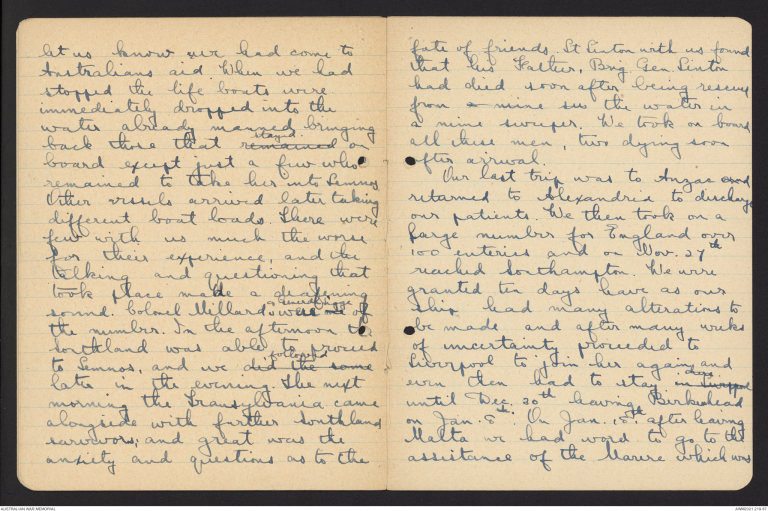
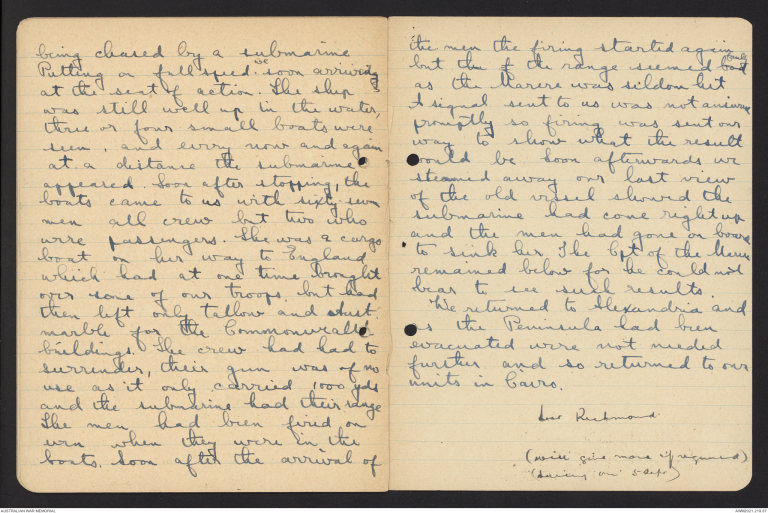
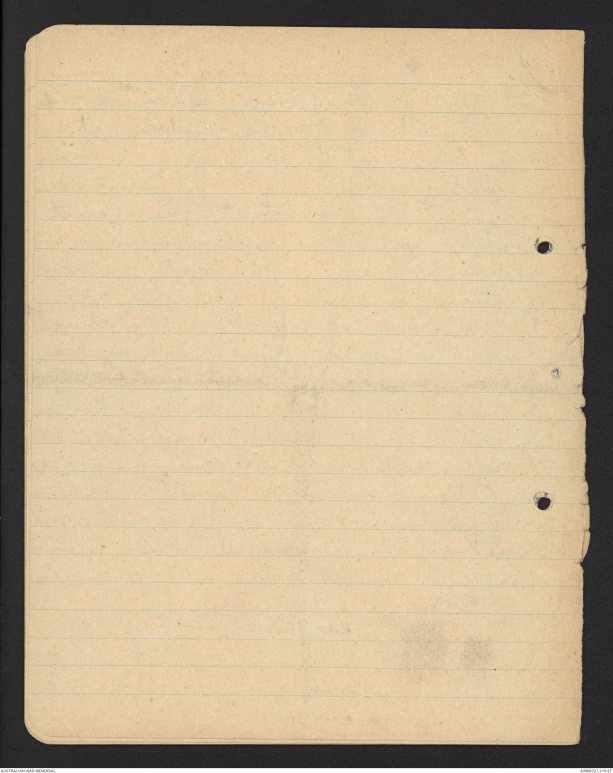
Butler Colln AWM 4 1
6/35
(*6/19*)
AWM4 1
AUSTRALIAN ARCHIVES
ACCESS STATUS
OPEN
SISTER RICHMOND
A.W.M.
LIBRARY
(Case) No 373.2
(1028)
125/25
Lemnos
Sr Richmond
Lemnos heavy
work, working 20 hours a day
staff - finding
patients dead for
quite a while.
Transferred from Guilford Castle
to H.M.T.S. Neuralia took
patients off torpedoed battleship
Goliath, also battleship Trimph
and "Majestic"
Malta with 8 bad patients
and only 5 nurses
At Anzac August 12th -
Turks shelled ship afterwards
Sent apologies for mistake.
The Official War Historian of the Commonwealth
Government (Dr. C. E. W. Bean), after his study of the
collection of private war records preserved in the Australian
War Memorial Library, wrote : -
"The private diaries in this collection furnish some of its most
valuable historical records, but, like all private memoirs which were
not compiled with any historical purpose, they should not be
regarded as first-hand evidence except where it is certain that they
are so. The diarist is almost always sincere in his desire to record
accurately, but he is subject to no obligation or inducement to
indicate whether he is recording his own observations or incidents
told him by friends or heard at third or fourth hand at the mess-table.
Thus, in some of the diaries in this collection, scenes described with
vivid detail, and without any warning that they are told at second
or third hand, have been found to be completely inaccurate in
important details. A certain number also have been written up
or revised long after the events, though doubtless usually from notes
made at the time. In most cases the student must rely on his
experience and on internal evidence to guide him in judging what is
and what is not likely to be historically accurate."
125/25
No 3 A. A. H. Dartford
Kent - Aug. 25 1919
Sister Richmond
To
Lt Col. Butler
In answer to your request for my
experiences I enclose the following.
Leaving Sydney on Nov. 25th 1914 on
H.M.A.S Kyarra, after calling at
Melbourne and Freemantle we
arrived in Alexandria Jan 14th 1915.
In Alexandria we had to await
orders for a few days and on the
18th proceeded to Cairo to Mena
House at the foot of the Pyramids
near to where our infantry were
camped. We had not been there
long when a septic pneumonia
broke out amongst the troops and
we were busy for a time. When
we became slacker other
hospitals needed help so we
were sent to help in different
parts, eight of us were sent to the
Citadel, the English Garrison Hospital,
a place full of historical interest
The sisters home had once been
the palace of Mehmet Ali
On April 21st, I, two Sister E. Chapman
Sister Spalding both A.A.N.S with
an English Regular had orders
to proceed to Alexandria for
transport work. On arriving
there we found ambulances
ready to meet us and were
conducted to the Guildford Castle
which was waiting our arrival
to start. It was staffed with one
I.M.S. crew the whole thing
being a gift of the people of India
furnished to perfection in every detail.
Every kindness possible was shown
to us.
On the morning of April 24th 1915
we arrived at Lemnos in Mudros Bay
which helped to show more clearly
the interest and beauty of our
surroundings. The whole harbour was
filled with transports and battleships
and other craft waiting for the
attack. At 2pm the a long line of
battleships headed by the Queen
Elizabeth proceeded to the Peninsula
From 6.a.m. to 7.a.m. the next
morning fully thirty transports and
two hospital ships (Gascon and
Cecilia) proceeded on their way,
it was a wonderful sight. More
French Cruisers came into the harbour
during the day. We heard all the
time the noise of the guns and
realised something big was taking
place.
We were restless to get to the
scene of action our turn coming
at 7.a.m. on the 26th arriving
at the entrance of the straits
(Sadel-Bahr) at 11:30 am. taking
our place all in the midst of
the many ships. British, French and
Russian Battleships bombarded the
forts throughout the day and heavy
fighting continued. The first lot of
wounded arrive alongside in a
lighter at 2.p.m. about 15 men
all terribly mutilated the first in
a moribund condition. The sight
almost parailzed one, the first
efforts seen of a battle, but there
was far too much to be done to
pay any attention to one's feelings.
At 8p.m. 150 more stretcher cases
arrived and so they kept coming
until we had over 500 cases on
board. Even then we could not
leave for the other ships had
returned full and we had to
act as a base hospital, so when
patients had a certain amount of
surgical treatment were transferred
to transports and sent away.
On April 30th a balloon ascends mean
us to make observations of the
enemy positions. Immediately after the
ascent numerous shells and shrapnel
are fired from the shore and about
to fall very near us. The rumour
of an aeroplane attack by the
enemy make it necessary for us
to go a mile distant for safety.
Work was very heavy, we did at least
20 hrs a day, going until we can
go no longer. There are only four
sisters and twelve orderlies,
with Hinduos. Not one of we four
could be spared for night duty
anxiety kept waking us up, and
causing us to go and see how
things were. In doing so I have
found patients dead, perhaps for
quite a time, undiscovered, not
due to neglect but because of the
shortness of staff. Our deaths by
May 1st had been 31 and so on
the 2nd we were not sorry to
be returning to Alexandria, with
so much of the of the British
Army which we hoped might
get better treatment at the base.
Arriving at Alexandria at 11a.m.
May 4th disembarkation commenced
but oh! such a muddle, hospitals
had been opened and there were
no staffs to run them and so
orders were given and countermanded
and some double compound
femurs were moved and removed
from their bunks to the stretchers
as a result. Finally about half
were sent to Port Said as there
was not sufficient room in
Alexandria. This was the first
load to reach this port and
the people were most enthusiastic
and considering conditions had
shown great powers of organisation
The ambulances were not many
small and drawn by donkeys
and when they gave out
butchers carts were resorted to. Then
by some mistake on the part of
the military the light cases were
sent to the regular hospital and
the more severe to some schools
used temporarily run by just the
one trained nurse (who was a
married woman) and lay helpers.
No sooner than the patients had
departed we received word to
proceed to Cairo as the Guildford
Castle was wanted for India. It
just seemed the last straw we
were so tired and it was worse
to be met with word on arrival
at Cairo to return by the next
train to Port Said as orders had
been changed.
On our next trip another sister
was added to our list somewhat
of an invalid sent I think for
the recovery of her health. However
it appeared to make very little
difference for what we did was just
like a drop in the ocean to what
should have been done. We took on
many men from the torpedoed
battleship Goliath. On our return
again to Alexandria we had much
the same kind of experience and
so found ourselves at Port Said
once again.
This time the Guildford Castle
was really transferred to Indian
Service and we were sent to
H.M.T.S. Neuralia, a finer vessel
but not fitted for hospital work
so had to proceed to Alexandria.
Here a number of rough wooden
bunks were put hastily in and
with a red cross flag were
sent to Lemnos. This time we had
many from the ^torpedoed Battleships Triumph
and Majestic. We went to Malta
with 860 patients and 8 nurses
Another trip reaching Cape Helles
on June 26th we were placed near
the shore just near the remains
of the Majestic to find a big
battle proceeding. The Turks
were making for a gun on the
Cape firing from the Asiatic side
and the British Hospital being
in line caught it and killed
several patients. With glasses one
could see the men falling and the
poor horses galloping around
after being wounded. We nearly
filled and were sent to Lemnos then to
^Anzac getting many of our own boys and
New Zealanders. On return again
to Lemnos General Barti joined us
and so went to Malta Alexandria. On our
next return trip we were sent to
where the Royal Edward had
been torpedoed the night before
going round and round the wreckage
to see if there was anyone alive
Our staff had by this time increased
to ten, five English and five Australian
the other two being Sister Anderson
from Perth and Sister Madeline
Wilson from Queensland.
When at Anzac on Aug 12 the we
found the Turkish machine guns
turned right on us one night
and as I was on duty with the
deck patients had some anxious
work for the men were packed
everywhere one was hardly able
to walk amongst the stretchers.
One boy whom I had attended
to and recovered his wound was
struck again in the leg. I sent
for the M.O. and on coming up
was just missed by a piece going whizzing
between his legs. We moved farther
away and the next day the
Turks apologised for what they
said was a mistake. On this
return we were sent to where the
Royal Edward had been torpedoed
the night before to see if there were
any alive. We sailed around the
wreckage but our search was in
vain.
On Aug 23rd we arrived at Suva
Bay where a new landing had
been affected and took on wounded
very quickly, and then go went to Malta
again. On our return on Sept 2nd
we received a wireless to say that
the Southland had been torpedoed
being about twenty miles distant
ten miles sth of the Is. of Strati
We made rapid speed and as
we drew near saw a vessel
well listed and boats full
of men about. We made great
preparations in the wards for drowning
men and all had to wear
lifebelts. It was exciting the cheering
from the boats and songs, we
were not near enough to see
the uniform but the old "Cooee"
let us know we had come to
Australians aid. When we had
stopped the life boats were
immediately dropped into the
water already manned bringing
back those that remained stayed on
board except just a few who
remained to take her into Lemnos
Other vessels arrived later taking
different boat loads. There were
few with us much the worse
for their experience, and the
talking and questioning that
took place made a deafening
sound. Colonel Millard ^a General
in charge were one of the number. In
the afternoon the Southland was able to proceed
to Lemnos, and we did the some followed
later in the evening. The next
morning the Transylvania came
alongside with further Southland
survivors, and great was the
anxiety and questions as to the
fate of friends. Lt Linton with us found
that his father, Brig. Gen. Linton
had died soon after being rescued
from a mine in the water in
a mine sweeper. We took on board
all these men, two dying soon
after arrival.
Our last trip was to Anzac and
returned to Alexandria to discharge
our patients. We then took on a
large number for England over
100 enteries and on Nov 27th
reached Southampton. We were
granted ten days leave as our
ship had many alterations to
be made and after many weeks
of uncertainty proceeded to
Liverpool to join her again and
even then had to stay in Liverpool
until Dec 30th leaving Birkenhead
on Jan 8th. On Jan 18th after leaving
Malta we had word to go to the
assistance of the Marere which was
being chased by a submarine
Putting on full speed ^we soon arrived
at the seat of action. The ship
was still well up in the water,
three or four small boats were
seen, and every now and again
at a distance the submarine
appeared. Soon after stopping, the
boats came to us with sixty-seven
men all crew but two who
were passengers. She was a cargo
boat on her way to England
which had at one time brought
over some of our troops but had
then left only tallow and sturt
marble for the Commonwealth
buildings. The crew had had to
surrender, their gun was of no
use as it only carried 1000 yds
and the submarine had their range
The men had been fired on
even when they were in the
boats. Soon after the arrival of
the men the firing started again
but the f the range seemed bad and
as the Marere was seldom hit
A signal sent to us was not answered
promptly so firing was sent our
way to show what the result
would be soon afterwards we
steamed away our last view
of the old vessel showed the
submarine had come right up
and the men had gone on board
to sink her The Cpt of the Marere
remained below for he could not
bear to see such results.
We returned to Alexandria and
as the Peninsula had been
evacuated were not needed
further and so returned to our
units in Cairo.
Richmond
(Will give more if required)
[[During on 5 days?]]
 Sam scott
Sam scottThis transcription item is now locked to you for editing. To release the lock either Save your changes or Cancel.
This lock will be automatically released after 60 minutes of inactivity.